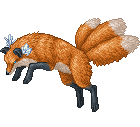Viewing Tanner

Hardiness: 12
Appearance: 6
Emerged: 9:13 03.01.2022
Matured: 0:25 05.01.2022
Fully grown Transira Alsaltos are almost indistinguishable from nonhybrid Alsaltos. The unique nature of their mixed DNA, however, allows for pelt and crystal combinations not seen in the wild. Some Transira Alsaltos are also capable of forming a symbiotic relationship with Vulpa Brulo. Their diet is the same as nonhybrid Alsaltos, though due to being raised in a laboratory setting, they do not have the innate hunting skills needed to survive on their own. With proper instruction, they may be useful companions for field expeditions because of their pleasant temperament and strong aptitude for learning. The latter trait can lead to destructive behavior if a Transira Alsalto is not given proper attention, so researchers who wish to study these hybrids should be prepared to handle their needs. They are capable of breeding with other Alsaltos, but caution is recommended until thorough studies on their health and longevity are completed.
The creatures that dwell in this rather desolate world still display some diversity in appearance, eating habits, and social behavior. Whether they have fur or feathers, skin or scales, their unique genetic makeup allows for a variety of colors and markings within each species. Despite limitations in food sources, herbivores, omnivores, and carnivores are all present in the food chain, and each species requires specialized care within a laboratory. Although the artificial setting of housing units and breeding pods precludes most opportunities to study true interspecific behavior, the interactions within and between species has been studied extensively in the wilderness by scientists daring enough to venture beyond the outpost’s walls.
